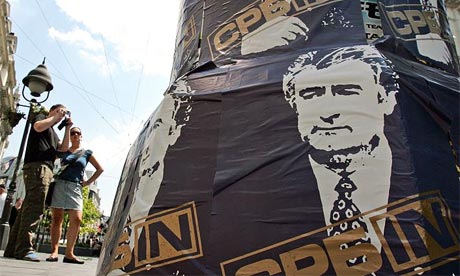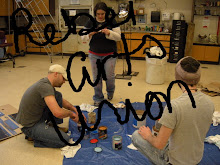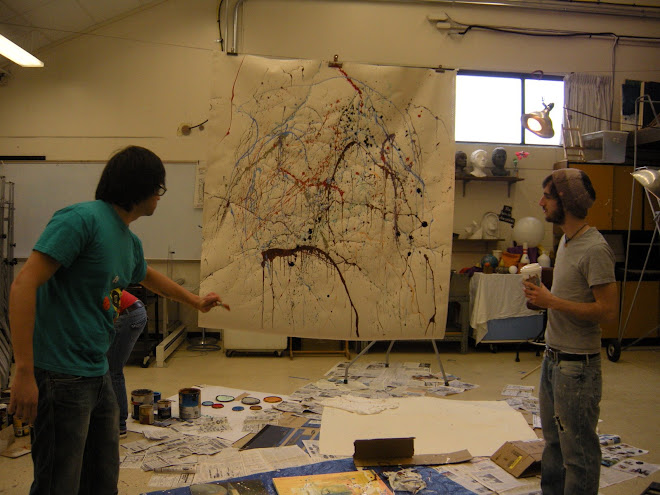Should PEN condemn Radovan Karadzic's poetry?
PEN Slovakia has criticised the publication of a poem by Radovan Karadzic but the line between myth-making and lying is a fine one

A pedestrian takes pictures of posters supporting Radovan Karadzic in downtown Belgrade. Photograph: Andrej Isakovic/AFP/Getty Images
It's tempting to use the news that PEN Slovakia condemned the publication of a poem by Radovan Karadzic to criticise PEN for failing to stick to its principles on freedom of expression: International PEN's statement that "everyone has the right to freedom of opinion and expression" doesn't sit easily with a PEN centre arguing that a 'poet' shouldn't be published. But to reduce it to a simple censorship versus freedom-of-expression debate does a disservice to PEN's extensive work, and also evades larger questions of what to do about Karadzic's work, and the appeal it still holds to those who see him as a hero.
Although it's worth noting that national PEN Centres are semi-autonomous within the organisation, the action raised uncomfortable questions that are presumably the subject of much internal debate. The last time many saw PEN's name in the news was when Margaret Atwood, vice president of International PEN, pulled out of Dubai's literary festival in February, expressing her dismay at news that a novel with a gay protagonist had been debarred, although she later appeared via videolink to participate in a discussion about censorship.
Do Atwood's actions contradict PEN Slovakia's position on Karadzic's poems? Or, if PEN stands for "the freedom to express ideas without fear of attack or…persecution", does this mean that writers whose work incites persecution of others shouldn't be protected? Perhaps it's not PEN's failure, so much as a larger, collective one, that we're yet to figure out a clear position on hate speech in 'literary' works. Even if we don't agree with PEN Slovakia's decision - and I'm not sure I do - it provides PEN with the chance to further public debate about free speech specifically in relation to hate speech, building on recent discussions in Dubai.
Which leaves the more fundamental question of what to do with Karadzic's poetry. Although few would argue poetry can be used as evidence at The Hague, Karadzic's poetry was part of a larger project of myth-making, like glorifying the 1389 Battle of Kosovo to legitimise claims of Serbian superiority. His poetry is also considered an affront by some because it was still published (or merely republished, the debate goes) even when the Serbian government vowed it was searching for Karadzic: one poem published in 2005 references a remote Montenegrin monastery where Karadzic was rumoured to be hiding. In his poems, Karadzic both rewrites nationalist myths and stitches himself into a mythologised modern history.
One of many sad ironies is how Karadzic's name echoes the 19th century philologist Vuk Karadzic. Vuk's compilation of the first Serbian dictionary and documentation of Balkan stories means he is often hailed as the grandfather of modern Serbian identity, a Balkan Goethe mixed with the brothers Grimm. But his singular life, from his youth in the Serb revolt against the Ottomans, to his involvement in the Illyrian movement, and pan-Slav affinities against the Austro-Hungarian Empire, contains the multitudes of regional identities that Radovan, and other extreme nationalists on all sides, tried to destroy.
And yet, Vuk Karadzic, Radovan Karadzic and many PEN writers do engage in the same ancient act: rewriting myths. A few years ago, aongside writers such as Jeanette Winterson, Margaret Atwood contributed a novel, The Penelopiad, to a publication series on the subject of "myth". Atwood's sensitive reworking of the Odyssey from Penelope's viewpoint was a testament to the vitality of rewriting myth, and particularly its power to reclaim the 'lost' voices of traditional history: wives, handmaidens, servants. Though often dark and haunting, the fiction in the Myth series celebrated myth as a means of resisting life's reduction to (patriarchal? Western?) history-book 'facts'.
Radovan Karadzic's myth-making doesn't contradict this position, but explodes any cosiness there may have been in occupying it, opening the uncomfortable idea that another word for "myth" may be "lie". While Atwood rewrites myths to give voice to the voiceless, other writers hold the power to rewrite myths to silence those weaker than them. Perhaps the point PEN Slovakia raises is to what extent we can distinguish between the two. Recent Balkan history, perhaps more than anywhere, shows the damage myth-making can do, and Radovan Karadzic drew power from his ability to spin poetry, of various sorts, from historical half-truths. Can we celebrate the co-existence of different 'versions' of truth, as the Myth series did, if some writers' versions entail denying other histories, denying other nations, and afterwards denying that systematic persecution took place?



1 comment:
Poetry is nearer to vital truth than history. ~ Plato
Post a Comment